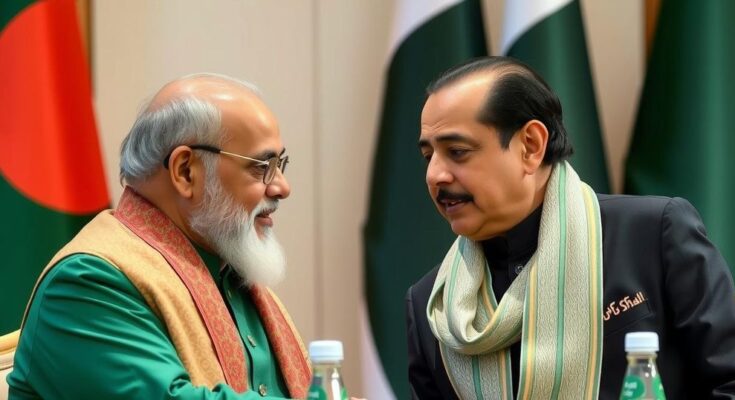Muhammad Yunus, interim leader of Bangladesh, met Pakistan PM Shehbaz Sharif during the 11th D-8 Summit in Cairo. They discussed resolving long-standing issues from Bangladesh’s 1971 separation from Pakistan and enhancing bilateral relations, trade, and cultural ties. This meeting signifies a potential shift in Bangladesh’s foreign policy amid evolving regional dynamics.
In a notable diplomatic encounter on the sidelines of the 11th D-8 Summit in Cairo, Bangladesh interim leader Muhammad Yunus engaged with Pakistan’s Prime Minister Shehbaz Sharif. This meeting signifies a pivotal moment for Bangladesh, especially given its historically tense relationship with India. Yunus expressed his intention to address lingering issues stemming from Bangladesh’s separation from Pakistan in 1971, aiming to facilitate progress between the two neighboring nations.
The geopolitical context surrounding this meeting is deeply rooted in the history of Bangladesh and Pakistan, which were once unified until the 1971 war led to Bangladesh’s independence. Following independence, political dynamics shifted considerably, with Bangladesh forging closer ties with India. In recent times, Bangladesh’s leadership, particularly under Sheikh Hasina, has had a more complex relationship with India, which has been characterized by both collaboration and tension. As Yunus steps into this interim leadership role, he anticipates rekindling the relationship with Pakistan while navigating Bangladesh’s evolving position on the international stage.
In his statement after the meeting, Yunus emphasized the need to resolve the outstanding issues that have hampered relations between the two countries since their split. He raised concerns that the outstanding matters must be addressed to foster mutual advancement. Prime Minister Sharif later articulated on X, “Had a very warm and cordial exchange with my friend Prof. Dr. Muhammad Yunus… We discussed strengthening historical and cultural ties, increasing trade, and exploring cooperation in IT, chemicals, leather, surgical goods and other sectors.”
In line with these discussions, both leaders affirmed their commitment to encouraging deeper bilateral cooperation as well as promoting economic development through trade and cultural exchanges, thereby underscoring the importance of diplomatic relations in addressing contemporary challenges.
The recent engagement between Yunus and Sharif highlights a potential shift in Bangladesh’s foreign policy approach and a desire to reconcile past disputes. This development may pave the way for strengthened ties between the two nations, contributing to regional stability and economic cooperation, especially for prospective trade and cultural partnerships. The dialogue represents a significant step toward collaboration that could reverberate throughout South Asia, fostering an environment of shared prosperity and mutual respect.
Bangladesh and Pakistan have a complex historical relationship, stemming from their unity as one nation prior to 1971. The split was precipitated by a civil war that led to the independence of Bangladesh and significantly altered regional dynamics. Following independence, Bangladesh’s relationship with India deepened, particularly under the leadership of Sheikh Hasina. However, the interim leadership of Muhammad Yunus represents a potential pivot in Bangladesh’s foreign relations as he seeks to address long-standing bilateral issues with Pakistan amid a backdrop of shifting alliances and geopolitical strategies.
In conclusion, the meeting between Muhammad Yunus and Shehbaz Sharif marks a significant diplomatic development that may reshape Bangladesh’s foreign relations. Yunus’s initiative to resolve historical grievances brings to the forefront the importance of dialogue and cooperation between the two nations. Along with a commitment to enhance trade and cultural exchanges, this engagement underscores the potential for strengthened bilateral ties that can contribute to regional stability and prosperity for both countries.
Original Source: www.india.com




